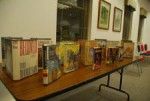Bannd Books Celebrated at Library

Literature lovers of the Hamilton and Colgate communities celebrated their freedom to read Tuesday evening at the annual Banned Books Read-Out, which took place at 7:00 p.m. in the Hamilton Public Library Common Room.
The event began with a presentation on censorship by Colgate Librarian Franny Livermore and continued with a discussion led by several community members, Colgate Politics and Education students and Associate Professor of Education Studies Barbara Regenspan.
Regenspan read and discussed excerpts from 13 books that have been challenged in the past for content and inappropriateness.
Livermore defined a challenge to a book as a formal written complaint and named several reasons for why schools and libraries have sought and continued to ban certain literary works.
“Many books have been banned for sexual content, offensive language, graphic depictions of violence, religion, racism and the concern that language and content would harm a reader or influence a reader’s actions,” Livermore said. “Banned books and censorship are not just historical problems; they are active issues.”
Livermore also discussed the civic and social problems of book banning, invoking the First Amendment freedoms of expression and dissent and the authenticity of foul language.
“We’re going to hear it and our children are going to hear it,” Livermore said. “Sensational topics make for sensational reading, so get out there and read banned books.”
Readers took Livermore’s advice as they got up the podium and shared portions of their favorite children’s stories or novels, along with explanations of how and why the work was challenged.
Kate Reynolds of the Colgate Bookstore read from the most challenged book of the year, a children’s picture book entitled And Tango Makes Three about two male penguins that fall in love and raise a child.
Susan Tallman read from The Chocolate War by Richard Cormier, which she described as a study in evil.
“The book is an exaggeration, but I think it is terribly important for us to recognize that authority figures can be dangerous to children,” Tallman said. “In my opinion, children should challenge authority figures.”
Sophomore Stephanie Fazio, a Politics and Education student, chose a portion from Of Mice and Men by John Steinbeck, the second most frequently banned book in the 1990s.
“So many of its themes make it important to keep in the high school curriculum,” Fazio said.
Junior Maddie Watrobski shared an excerpt of Black Beauty by Anna Sewell, the first book she read in kindergarten. The novel was banned under Apartheid in South Africa because the government was afraid the title would empower African Americans.
“If they had read even the first few pages, they would have realized it was just about a horse,” Watrobski said.
Colgate Politics and Education professor Barbara Regenspan said she encouraged her students to participate in the read-out because of its connection with issues of oppression, power and dominance, and race and class conflicts discussed in the course.
“Some of my students will be teachers and doing banned books work is a good curriculum idea,” Regenspan said.
The Banned Books Read-Out was open to the public and co-sponsored by the Chenango Valley Peace Alliance, the Colgate University Bookstore and the Hamilton Public Library. Refreshments were provided courtesy of the Friends of the Hamilton Public Library. Handouts discussing the Library Bill of Rights and material selection policy, along with lists of banned books, were made available in the back of the room. Copies of banned books, including Catcher in the Rye by J.D Salinger and Beloved by Toni Morrison, were also displayed for viewing purposes.
This year’s read-out was a preview to Banned Books Week, which is supported nationally by the American Library Association from September 29th through October 6th, according to Hamilton Public Library director Barb Coger.
The read-out also took place in conjunction with the “Censorship In Schools and Libraries” exhibit that will be mounted on posters throughout the library until September 25th.
This exhibit, sponsored by the Long Island Coalition Against Censorship, explores the rights of free speech and free press guaranteed by the First Amendment, definitions and incidents of censorship and the Library Bill of Rights.
“We want to bring awareness to the idea that we have the freedom to read,” Coger said. “As the American Library Association puts it: ‘Free People Read Freely.'”



